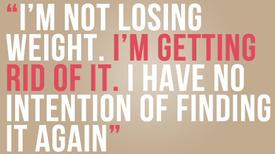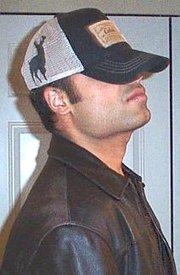Really confused about eating back calories

teawithmilkplease
Posts: 17 Member
So the general consensus seems to be that you should eat back your calories if you're exercising from what I've found by looking on google and from my friends on MFP (even though some people still say you shouldn't), but I'm still confused about some things. I'm being honest, so please don't jump on me.
If I'm exercising to lose weight, I thought the point of exercising was to burn calories. Other than it just being good for your body to be active, what is the real reason I'm exercising if I'm just eating all of those calories back?
Also, should I eat all of my calories back, or just some of them? If my goal is 1400, even if I've exercised should I eat all of those calories back so that my intake equals 1400 for the day?
I appreciate the help.
If I'm exercising to lose weight, I thought the point of exercising was to burn calories. Other than it just being good for your body to be active, what is the real reason I'm exercising if I'm just eating all of those calories back?
Also, should I eat all of my calories back, or just some of them? If my goal is 1400, even if I've exercised should I eat all of those calories back so that my intake equals 1400 for the day?
I appreciate the help.
0
Replies
-
You're still going to get a lot of differing opinions because what works for some people doesn't work for others etc etc.
Here's how I look at it. 1400 is my goal on days I do not go to the gym... and on days I do go to the gym? It's probably still my goal, but I give myself a little more leeway. If I want another piece of fruit or a bigger portion of salmon for dinner I'm more likely to allow it if I've worked harder at the gym -- and I'm more likely to need it.
If eating back some of your exercise calories helps you go to the gym more consistently then it's probably a good thing. It's not just about losing weight, right? You want to improve your fitness and maintain your muscle mass. You'll be in better all around physical shape if you're happy going to the gym and it's not an uphill slog through a big calorie deficit. It might be a little slower going than not eating anything back and it's obviously harder work than just sitting at home and only eating your 1400 to lose weight.
You have to figure out what works for you through trial and error and then try to keep an open mind about what works for other people.0 -
Just do it. I've lost 43 pounds, eating my calories back. No need to starve yourself to lose weight. IMO :flowerforyou:0
-
My body won't allow me to eat back and I'm fine with that! I've tried all avenues and am sticking with the way things are. I have energy and I'm healthy0
-
It is confusing. I've read so much back and forth. Here's my simple take on it.
To lose weight you need a calorie deficit. You can get this by reducing your calories OR exercising OR a combo of both. 3500 calories makes 1 pound and you shouldn't aim to lose more than 2 pounds a week (if you want to be healthy). So you need to either eat 700 less than your tdee or burn 700 calories or do a combo to equal that amount.0 -
going to the gym/working out, etc. is partly to help preserve muscle... remember the heart is a muscle... cardiovascular is important when you have a calorie deficit as you want to preserve all of your lean muscle mass.
Eating back your calories is to avoid too high a calorie deficit - when your daily deficit is too large, your body has some interesting, but not necessarily good, responses - one is to take calories needed from muscle - obviously not good to deplete lean muscle mass since it is metabolically active and impacts your overall metabolism.
So while it may seem that exercising should be used to create a larger calorie gap, that isn't typically a great idea for most people - one major reason you want to exercise is to ensure that the tissue you DO shed with the gap you are making with your diet (and is still there when you eat back your exercise calories) is fat and your body maintains as much muscle as possible... lighter, but high body fat isn't probably the look you have in mind for yourself...:)
Best of luck!0 -
Everyone is going to have different opinions. I personally don't eat back my exercise calories. I don't even log my exercise here so that I'm not tempted. It has not been a problem for me. I'm not starving and have a good bit of fat that my body can burn through. I'm getting plenty of protein (on days that I work out and days that I don't) so I'm not worried about that. I have only lost 10 pounds since I started MFP but am down more than that (about 30 give or take I didn't get a scale until 20 lbs ago). I do some HIIT and strength training. I'm quite sure that MFP overestimates the calories burned by exercise (as do most fitness machines). If I am ridiculously hungry of feel unwell, I might eat an extra 80-100 calories of healthy protein (fish or a protein shake) other than that, I try to stick to my goals.0
-
MFP sets calories on the low side to enable you to eat back exercise calories. Exercise will get you fitter, looking better and stimulate your metabolism. Enjoy and think of exercise as an opportunity to eat more good stuff. :-)0
-
Whether you should or should not depends completely on how you calculate your total caloric intake.
If you go by what MFP says, EAT BACK YOUR CALORIES. The reason is that the number of calories MFP gives you to eat is already set at a significant deficit from your TDEE. If you don't eat them back, you will just be creating an unhealthy deficit, one far greater than the one your are supposed to have.
If you calculate your calories using TDEE-20% and set your activity level at sedentary or lightly active, eat back your calories for the same reason as above.
If you calculate your calories using TDEE-20% and include your exercise in your TDEE, do not eat back exercise calories because that calculation already accounts for the exercise calories. You can calculate TDEE at http://scoobysworkshop.com/accurate-calorie-calculator/0 -
Figure out your BMR--that should be the floor for your net calories for the day, not total calories. You can check the reports feature on your homepage to look at your net calories. If you exercise a lot and do not eat enough, you will be depleting your muscles and vital organs from fuel. Some people also do not respond well to being constantly underfed like this and end up binging like crazy. If you want sustainable fat loss, you need to eat enough.
TL;DR: Yes, eat them back.0 -
I think you really need to understand "what is a calorie deficit". Eating them back or not eating them back are just two methods of implementation, you can go with either one which suits you best, but the idea is pretty much the same (the core is, there is always a calorie deficit, and it becomes clearer if you look at numbers over a week - not a day - unless you work out consistently every day of the week).
*** Eating calories back method
You chose your daily intake (say X) only considering your normal daily activity, not workouts.
Eat at a deficit from that value.
When you do a workout, add that to the daily goal, and eat the calories back.
You can eat it all back, or a part of it back, depends on how full you feel.
*** Not eating calories back method
You chose your daily intake (say Y) considering normal daily activity + estimated weekly exercise workouts.
This will be a higher value than X above, because your exercise workouts are factored into this value.
When you do a workout, don't add that to your daily goal (so the goal stays the same), therefore you don't eat calories back.
The problem with this is, you need to be consistent with your estimate.
Hope this helps.0 -
Whether you should or should not depends completely on how you calculate your total caloric intake.
If you go by what MFP says, EAT BACK YOUR CALORIES. The reason is that the number of calories MFP gives you to eat is already set at a significant deficit from your TDEE. If you don't eat them back, you will just be creating an unhealthy deficit, one far greater than the one your are supposed to have.
If you calculate your calories using TDEE-20% and set your activity level at sedentary or lightly active, eat back your calories for the same reason as above.
If you calculate your calories using TDEE-20% and include your exercise in your TDEE, do not eat back exercise calories because that calculation already accounts for the exercise calories. You can calculate TDEE at http://scoobysworkshop.com/accurate-calorie-calculator/
BINGO! We Have a winner 0
0 -
0
-
Depending on how hard you work out, it is really a good idea to eat afterwards. Your body is tricky and if you are working out really hard and not eating enough it thinks that you are going through some sort of stressful period and will make your body go into "starvation mode" and it will hold onto the fat more so tan if you had a healthy snack or good fats after a workout. Eat things like avocados or nuts. Limit big portions of carbs like bread and pasta and have a glass or two of water
 Hope this makes help! 0
Hope this makes help! 0 -
Depending on how hard you work out, it is really a good idea to eat afterwards. Your body is tricky and if you are working out really hard and not eating enough it thinks that you are going through some sort of stressful period and will make your body go into "starvation mode" and it will hold onto the fat more so tan if you had a healthy snack or good fats after a workout. Eat things like avocados or nuts. Limit big portions of carbs like bread and pasta and have a glass or two of water
 Hope this makes help!
Hope this makes help!
Sorry, but your body will not go into 'starvation mode' if you do not eat after a workout.0 -
Youre not understanding how MFP is set up. When it takes your numbers and gives you a calorie goal, there is already a deficit built into that goal number. If you don't eat back your burned calories you are creating a double deficit which in one day or so is no big deal, but over time can be unhealthy and can (not will..but definately can) make losing weight at all harder because your metabolism will slow down because you've convinced your body there's a famine and it doesn't want to die.0
-
I stand correctly. Duely edited.Sorry, but your body will not go into 'starvation mode' if you do not eat after a workout.0 -
Seriously drop $100 and get a consult with a nutritionists. The amount of boneheaded advice here is amazing.0
-
Whether you should or should not depends completely on how you calculate your total caloric intake.
If you go by what MFP says, EAT BACK YOUR CALORIES. The reason is that the number of calories MFP gives you to eat is already set at a significant deficit from your TDEE. If you don't eat them back, you will just be creating an unhealthy deficit, one far greater than the one your are supposed to have.
If you calculate your calories using TDEE-20% and set your activity level at sedentary or lightly active, eat back your calories for the same reason as above.
If you calculate your calories using TDEE-20% and include your exercise in your TDEE, do not eat back exercise calories because that calculation already accounts for the exercise calories. You can calculate TDEE at http://scoobysworkshop.com/accurate-calorie-calculator/
Super explanation that!! 0
0 -
I would just try both and see what works for you! Everyone is different, I know that eating them back did not work for me! I have been doing for 2 weeks and didn't loose anything. Good Luck!0
-
Try out eating calories back for a month and not. See how you feel about it!0
-
Exercise will burn calories yes, but your body needs the calories in the first place in order for it to perform that exercise. If you read the stickies on the forum, you will see that MFP is set up to give you a calorie goal that DOES NOT include your exercise. When you do exercise and log it, it will add those burned calories to your total calorie goal for the day. The idea is that you now eat your amended calorie goal for the day...........why would it do it otherwise!!!!!!
MFP has very cleverly and kindly already calculated the amount of deficit of calories needed to lose the amount of weight that you input you wanted to lose. If you do not follow the programme correctly - i.e. eat back your calories burned exercising, then you are creating an even bigger deficit which is not healthy for your body.
Edited to add: Calorie deficit = weight loss
Exercise = fitness0 -
I really appreciate all of the advice and helpful information everyone. Thank you.0
-
Bump. Great advice, thanks!0
-
My thought is, you calculate your TDEE using no activity. Then you create a 10-20% deficit to lose weight. If you dont exercise, you will lose weight using this strategy.
But exercise has other benefits such as cardiovascular and joint benefits, in addition to making you look good and 'lean'.
So if you add exercise to this equation, you will reap the benefits of exercise but now your calorie deficit will be 30% if you dont eat those calories back. Thats a huge calorie reduction, which would make this a short term lifestyle. So you should stick with your original 20% deficit and eat back the exercise calories.0 -
Exercise, in addition to making you healthier and look better and all that other great stuff, makes you able to (from my point of view) eat like a normal person. :laugh:
It creates the grand illusion that this comes easily to me and I'm one of those people who can eat whatever she wants and never gain weight. 0
0
This discussion has been closed.
Categories
- All Categories
- 1.4M Health, Wellness and Goals
- 394.2K Introduce Yourself
- 43.9K Getting Started
- 260.4K Health and Weight Loss
- 176.1K Food and Nutrition
- 47.5K Recipes
- 232.6K Fitness and Exercise
- 438 Sleep, Mindfulness and Overall Wellness
- 6.5K Goal: Maintaining Weight
- 8.6K Goal: Gaining Weight and Body Building
- 153.1K Motivation and Support
- 8.1K Challenges
- 1.3K Debate Club
- 96.4K Chit-Chat
- 2.5K Fun and Games
- 3.9K MyFitnessPal Information
- 15 News and Announcements
- 1.2K Feature Suggestions and Ideas
- 2.7K MyFitnessPal Tech Support Questions
















